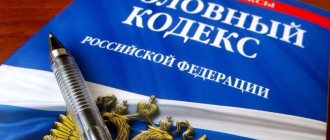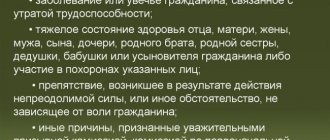Nuances of calculating the investigation period
Two months is the standard investigation period. The procedure for conducting a preliminary investigation in a criminal case allows the investigator to complete the proceedings in a shorter period of time, which is not limited. True, this rarely occurs in practice, mainly at the local level and in relation to ordinary crimes.
Any extension is considered as a forced measure when, for objective reasons, the investigation cannot be completed within the prescribed period.
Article 162 of the Code of Criminal Procedure of the Russian Federation defines cases when certain time periods are excluded from the calculation of the investigation period:
- The period for the investigator to appeal the prosecutor's decision to return the case:
- for further investigation;
- to change the charges (scope and (or) qualifications);
- to re-draft the indictment;
- to address deficiencies in the investigation.
- The period during which criminal proceedings were suspended.
In the first case, if the investigator’s appeal of the prosecutor’s decision is successful, the case is sent to court. If by this time the investigation period has expired, it is not considered violated. If the investigator’s complaint is refused and the case is returned to him for additional investigation, the period that has expired by that time must be extended. Otherwise, the investigation cannot be continued.
The second situation is normal. The decision to suspend is made very often, especially for unsolved crimes. If the grounds for suspension no longer exist or the investigation needs to be continued, the proceedings are resumed and the investigation period is set for 1 month. Further extension is carried out according to the general rules, taking into account the period that has expired at the time of suspension of the criminal case and an additional 1-month period.
If the proceedings were terminated and then resumed, a 1-month period is also established for additional investigation. Further extension is carried out according to general rules and takes into account the period of investigation that has elapsed up to this point before termination and after resumption.
Everything about criminal cases
Why is it useful for a defense lawyer to take into account the timing of the investigation?- the fact is that they can be used to some extent predict the behavior of the investigator, sometimes this can be useful in defense. (Unfortunately, such a useful document as the Investigation Plan
the criminal case is hidden from the defense lawyer).
This makes it possible to conveniently distribute the workload (a lawyer, for example, can plan a vacation for a period of calm in the case) and reassures the client, to whom the lawyer can explain how the investigation process will develop further.
USUAL SCHEME according to which the investigation of a case is carried out
In a criminal case, there is usually no uniformity in investigative actions. As a rule, the investigation progresses in three stages, it looks like this:
I). A burst of activity at the very beginning
- first there is a burst of activity: immediately after the initiation of the case, the most important witnesses are interrogated, decisions are made to order examinations, and a preventive measure is chosen.
- also, it is usually during this period that the defense makes such a critically important decision: whether to testify (and what kind) or refuse to testify. In the subsequent defense it will be extremely difficult to change the testimony (more about this here: Change earlier
testimonial data, selection of materials).
II). Quiet period
- then suddenly there is complete silence, for 1-2 months it is as if the accused has been completely forgotten. This period is especially psychologically difficult for the accused and the defense lawyer:
— there was just frantic activity, and suddenly there was silence.
- No one knows what the investigator is doing during this period. What witnesses does he interrogate, what do they say? Neither the accused nor the defense attorney has the right to receive this information. (Note: copies of documents that they can see during this period are indicated in paragraph 2, part 4, 47 of the Code of Criminal Procedure
and
clause 6, part 1 53 of the Code of Criminal Procedure
. But nothing more than that).
- During this period, the defense attorney is tormented by the relatives of the accused, demanding information from him and also demanding “to do something.” The defender cannot do either of these things and therefore often receives reproaches for inactivity.
III). A burst of activity at the very end
- after a period of silence, suddenly there follows a new outbreak of activity: the investigator suddenly calls the defender himself and demands, asks and almost begs to come to him today! And he asks to get acquainted with the examinations and the case materials as soon as possible (plaintively wailing that the boss demands that the case be urgently sent to the prosecutor).
— this outbreak of activity is easy to predict based on the start dates of the investigation.
Up to two months
- during the initial period of investigation, amounting to 2 months ( Part 1 162 of the Code of Criminal Procedure
) the investigator may not be in a hurry.
He has not only two months ahead, but also one additional month, which will be extended by his head of the investigative department ( Part 4 162 of the Code of Criminal Procedure
). That is, the extension will be carried out within the investigative department, and such an extension will not be interpreted as a violation. The need to extend the period by a month can easily be explained by objective reasons beyond the investigator’s control (for example: a long period of examination, the carelessness of operatives who cannot find witnesses).
Two to three months
- a period of up to three months, this is the usual investigation period for simple criminal cases. About a week before the end of the term, you can be sure that the investigator himself will start calling the defense lawyer and asking him to come to familiarize himself with the case. Usually at this moment the investigator is in an unenviable position:
— Firstly
: if the defense attorney begins to disrupt events by not appearing when called (he can always come up with reasons), then the investigator cannot simply call another lawyer.
According to the norm of Part 3 50 of the Code of Criminal Procedure,
he is obliged to wait 5 days (more about this here:
Iron day
, five mandatory days to wait for a lawyer).
- It’s useless to explain this to the head of the department, the investigator’s problems are only his problems (“he himself pulled out to the last line and now do what you want, but make it in time”).
— Secondly
: the accused may begin to delay the process of familiarizing himself with the case (citing fatigue, etc.).
To stop such delays, the investigator will have to resort to the mechanism of Part 3 217 of the Code of Criminal Procedure
, which will also take time and effort (appeal to court, court hearing).
After three months
- after the three-month period has expired, the head of the district department can no longer extend the terms. This means that the investigator will have to take the case materials and go to the investigative department at the regional level. There he will have to explain why he did not have time to complete the investigation.
- here it is not possible to get by with simple excuses and usually the investigator receives a reproach (in one form or another) for allowing defects in his work.
- after which the period can be extended by the head of the regional level up to 1 year ( Part 5 162 of the Code of Criminal Procedure
). In practice, extensions are issued in small portions, for a month or two. Therefore, the investigator will have to go to these extensions and explain the reasons for missing the deadlines each time.
After 12 months
— to extend the deadline beyond 12 months, the investigator will have to go to the federal level. Take the case materials and go to Moscow.
- therefore, such an extension is considered an extraordinary (and undesirable) event.
Extension of the investigation period
A very large number of criminal cases are being investigated in violation of the 2-month investigation period.
This often happens for objective reasons: the case is quite complex, requiring, for example, examinations and (or) interrogation of a large number of witnesses. But often the reason is banal red tape in the case, including those provoked by the heavy workload on investigators. The first time the pre-trial investigation period can be extended only up to 3 months . This is, in principle, considered a common occurrence. The legislation is also loyal to such an extension. The decision is made by the head of the investigative body, who is subordinate to the investigator conducting the investigation.
A second extension is permitted within 12 months . If by this point, for example, 3 months of the investigation have already passed, the additional period of investigation can be 9 months, no more. The decision is made at a higher level. The head of the relevant investigative body at the regional level or any of his deputies has the right to extend the period. The investigator's request for an extension must be motivated. The formal basis is the particular complexity of the investigation. As a rule, the following specific grounds are given: the conduct of examinations, the interrogation of a large number of witnesses, the large number of accused, the multiplicity of episodes of criminal acts, etc. Sometimes an extension is a necessary measure. This happens, in particular, when the proceedings were suspended, the general 3-month investigation period has expired, and it was possible to clarify the situation (for example, to identify the culprit) only at the end of the period. Here it is objectively necessary to extend the investigation in order to carry out the necessary investigative and procedural steps to complete the proceedings in the case.
The Code of Criminal Procedure of the Russian Federation allows for an extension of the period beyond 12 months, without setting boundaries. Such a decision is of an exceptional nature and is made at the federal level - by the head (his deputies) of the investigative body consisting of the Ministry of Internal Affairs/FSB, respectively, or the Chairman of the Investigative Committee of the Russian Federation. Very compelling reasons are needed for such an extension. High-profile cases often take so long to be investigated: terrorism, high-profile murders, multi-episode sexual crimes, etc.
Despite the fact that the decision to extend the investigation period is made by the head of the relevant investigative body, the initiator is always the investigator conducting the investigation. He prepares a resolution to extend the investigation period and submits it along with the case materials. This must be done no later than 5 days before the expiration of the investigation - an important point, which sometimes became a reason for the defense to challenge the fact of extending the investigation. If the extension decision is declared illegal, all subsequent investigative and procedural actions are automatically illegal. And although the courts, in practice, try in every possible way to refuse to satisfy such complaints, a different decision cannot be ruled out.
In practice, almost all investigator's decisions to extend the investigation period are satisfied. Otherwise, some other procedural decision will need to be made, and we can only talk about terminating or suspending the proceedings. However, an extension at the regional and, especially, federal level threatens the investigator with disciplinary action.
Time frame for investigation in the form of inquiry
In many cases, no investigation is carried out - the investigation is carried out in the form of an inquiry. All articles of the Criminal Code of the Russian Federation under which the investigation is being conducted are listed in Part 3 of Art. 151 Code of Criminal Procedure of the Russian Federation.
The terms of the inquiry differ from the terms of the preliminary investigation and amount to a much shorter period of time:
- The standard period is 30 days from the date of initiation of the criminal case. It can be extended for another 30 days by decision of the supervising prosecutor.
- In case of suspension and resumption of the inquiry, the additional period is limited to 10 days.
- Extension of the inquiry is possible for up to 6 months. The most common reason is the examination. Although the list of reasons is not limited to this alone, the main thing is to justify the extension. The decision is made by the district prosecutor or his deputies.
- The deadline for inquiry is 12 months. An extension for this period is allowed only in connection with sending a request for legal assistance in a foreign country. The decision is made by the regional prosecutor.
Since the inquiry in some cases can be carried out by investigators of the Investigative Committee of the Russian Federation, all decisions to extend the period of inquiry are made in such a situation by the head of the investigative body of the Investigative Committee at the appropriate level (local/regional), and not by the prosecutor.
Initiation of a criminal case with a pre-investigation check
The period for initiating a criminal case after filing an application, according to Art. 144, part 1 of the Criminal Procedure Code, should be no more than 3 days. This time is called a pre-investigation check and is allocated for the investigative or inquiry authorities to verify the significance of the reason for initiating a case.
For example, a citizen files a report with the police about beating. A case cannot be initiated until there is reliable evidence that the citizen was actually beaten and did not slip on the street. Therefore, the inquiry officer or investigator must send the applicant to undergo an investigative medical examination in order to establish the nature of the existing injuries or damage. This period between the submission of an application by a citizen and the initiation of a criminal investigation is the time provided for carrying out the necessary pre-investigative measures.
Pre-investigation check
The result of the pre-investigation check may be one of the following procedural actions:
- excitation of UD;
- refusal to initiate a criminal case (read about the grounds for refusal here);
- direction of the case according to jurisdiction.
Depending on the classification, criminal cases are considered in different instances:
- Investigative committee;
- Department of Internal Affairs (OVD);
- State Fire Service (SFS);
- Bailiff Service (Bailiff Service), etc.
Read more about the jurisdiction of criminal cases here
How long the pre-investigation check lasts depends on how many examinations and other investigative actions will need to be carried out to determine the need to initiate a criminal investigation. Therefore, the period allotted for initiating a case can be increased to 30 days (Article 144, Part 3 of the Code of Criminal Procedure). The basis for this may be reasoned arguments of the investigator or interrogating officer.
An order to increase the time limit may be issued by:
- the prosecutor on the basis of a reasoned request from the investigator;
- the head of the investigative body investigating the criminal case, at the request of the investigator.




